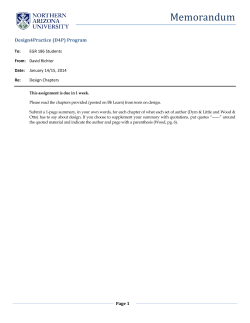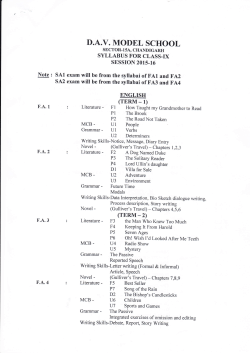
Labor in Contemporary Japan ï¼»PDF 231KBï¼½
For students enrolled in or before 2014 K0113 Labor in Contemporary Japan 【JPN LABOR】 2 credits Fall 2015 INSTRUCTOR: Taeko Shibahara EMAIL: sk112570@mail.doshisha.ac.jp Course Description This course explores Japanese society and culture through the lens of laobr. Through lectures, readings, and discussions, students are akded to consider the various experiences of labor in Japan based on a historical, sociological, and cultural analyseis. This course highlights the role of labor history in Japan in the pre-war, WWII, and post war eras. This course will combine lectures, readings, and weekly discussions. Course Objectives The objective of this class is to introduce students to some central issues in the study of labor history in Japan. Students will get a brief history of Japan since the late nineteenth century, focusing on the struggles and efforts working people to secure a better life for themselves and their families. By the end of the course, students will have a good overview of these issues and be able to intelligently analyze the contemporary questions raised by these. Course Requirements and Assignments a) Attendance, Readings and Participation: You are required to attend the lectures and have an attendance record of at least 80%. You are responsible for completing the readings (course readings and press handouts) for the day they are assigned and come to class prepared to discuss them. You are expected to actively participate in group discussions. b) Presentation: You are required to present one research paper on labour issues in Japan that will be assigned to you during the course. You will prepare a one page handout with bullet points, A4 single spaced, and make copies for all students. c) Final Paper: At the end of the course you are required to submit the research paper that is the final format of your presentation. Evaluation Criteria & Grading Grading for the course will be determined as follows: 1. 2. 3. Final Paper submission Contributions to the class including presentations, class discussions, attendance Reading Report submission 30 % 30 % 40 % Additional Information: CLASSROOM POLICIES 1. Since discussion is an essential part of this course please come to class prepared and on time. Do not enter the classroom if you are late more than 15 minutes. 2. Let me know if you have an emergency and will not be able to come to class. 3. Please turn off your mobile phones. It is inappropriate to go outside to make calls or to send or read text messages during class. 4. No sleeping in class. 5. Plagiarism and Cheating Doshisha University does not tolerate plagiarism, cheating, or helping others to cheat. These actions will result in an automatic “F” in the course. Plagiarism is defined as misrepresenting the work of others (whether published or not) as your own. It may be inadvertent or intentional. Any facts, statistics, quotations, or paraphrasing of any information that is not common knowledge, should be cited. For more information on paper writing, including how to avoid plagiarism and how to use citations, there are many resources to help you in the Library. Please speak with the Librarian. Course Materials Andrew Gordon, The Wages of Affluence: Labor and Management in Postwar Japan, Cambridge, Harvard University Press, 1998. Christopher Gerteis, Gender Struggles: Wage-Earning Women and Male-Dominated Unions in Postwar Japan, Cambridge, Harvard University Asia Center, 2009. E. Patricia Tsurumi, Factory Girls: Women in the Thread Mills of Meiji Japan, Princeton, Princeton University Press, 1992. Joshua Hotaka Roth, Brokered Homeland: Japanese Brazilian Migrants in Japan, Ithaka, Cornell University Press, 2002. Sheldon Garon, The State and Labor in Modern Japan, Berkeley,University of California Press. 1990 Taeko Shibahara, Japanese Women and the Transnational Feminist Movement before World War II, Philadelphia, Temple University Press, 2014. Additonal supplementtary articles will be placed on reserve or made available to students directly. Course Schedule Week 1Introduction Topic: Introduction, course description Assignment: Reading, Garon Chapters 1-2 Week 2 Labor in the pre-war period, 1 Topic: The Origins of Japanese Social Policy, 1868-1918 Garon, Chapter 1 Assignment: Reading, Garon, Chapter 3 Week 3 Labor in the pre-war period, 2 Topic: “The Social Bureaucrats and the Integration of Labor, 1918-27” Garon, Chapter 3 Assignment: Reading, Garon, Chapter 6 Week 4 Labor in the pre-war period, 3 Topic: Labor in the war state Garon, Chap. 6 Assignment: Reading, Shibahara Chapter 1 and Tsurumi Chapter 2 Week 5 Labor in the pre-war period, 4 Topic: Factory Girls in the Meiji era Shibahara Chapter 1 and Tsurumi Chapter 2 Assignment: Tsurumi Chapters 8 and 10 Week 6 Labor in the pre-war period, 5 Topic: Exploitation of female workers Tsurumi Chapters 8 and 10 Assignment: Reading Gordon, Chapters 1- 3 Week 7 Labor in the post-war period, 1 Topic: Labor and management to the 1950s. Gordon, Chapters 1-3 Assignment: Reading, Gordon, Chapters 4-6 Week 8 Labor in the post-war period, 2 Topic: Labor, Management, and State Gordon, Chapters 4-6 Assignment: Gordon, Chapters 7-9 Week 9 Labor in the post-war period, 3 Topic: Labor, Management, and State Gerteis, Chapters 4 and 6 Assignment: Reading, Gerteis, Chapters 4 and 6 Week 10 Contemporary labor issues, 1 Topic: Union and Women Gerteis, Chapters 4 and 6 Assignment: Kaye Broadbent, Women’s Employment in Japan: The Experience of Part-Time Workers, New York, Routledge, 2003, Chpaters 1-2. Week 11 Contemporary labor issues, 2 Topic: Feminization of part-time work Broadbent, Chapters 1-2 Assignment: TBA Week 12 Contemporary labor issues, 3 Topic: Family, Work, and Laws TBA Assignment: Reading, Keiko Yamanaka, “New Immigration Policy Unskilled Foreign Workers in Japan,” Pacific Affairs, 66, no. 1 (Spring, 1993), pp. 72-90 Kiyoto Tanno, “The Economic Crisis and Foreign Workers in Japan: Why Does Japan Treat Migrant Workers as Second Class Citizens?” Japan Labor Review, 7, no. 3 (Summer 2010), pp. 109-126 Week 13 Globalization and workers,1 Topic: Immigration Policies Keiko Yamanaka, “New Immigration Policy Unskilled Foreign Workers in Japan,” Pacific Affairs, 66, no. 1 (Spring, 1993), pp. 72-90 Kiyoto Tanno, “The Economic Crisis and Foreign Workers in Japan: Why Does Japan Treat Migrant Workers as Second Class Citizens?” Japan Labor Review, 7, no. 3 (Summer 2010), pp. 109-126 Assignment: Reading Roth, Chapters 1, 5, and 6 Week 14 Globalization and workers, 2 Topic: Experiences of Japanese Brazilian workers Roth, Chapters 1, 5, and 6 Assignment: Complete final paper and be ready for presentation Week 15 Review and Presentation Day Note: final paper due Note: This syllabus will be subject to changes and/or revisions
© Copyright 2025









